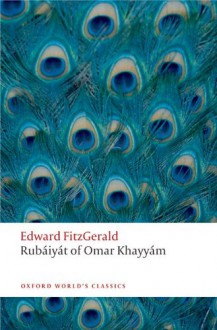
Rubáiyát Of Omar Khayyám
In 1859, Edward FitzGerald translated into English the short, epigrammatic poems (or "rubáiyát") of medieval Persian poet Omar Khayyám. If not a true translation--his Omar seems to have read Shakespeare and the King James Bible--the poem nevertheless conveyed some of the most beautiful and...
show more
In 1859, Edward FitzGerald translated into English the short, epigrammatic poems (or "rubáiyát") of medieval Persian poet Omar Khayyám. If not a true translation--his Omar seems to have read Shakespeare and the King James Bible--the poem nevertheless conveyed some of the most beautiful and haunting images in English poetry, and some of the sharpest-edged. By the end of the century, it was one of the best-known poems in the English language, admired by Swinburne and Ruskin. Daniel Karlin's richly annotated edition focuses on the poem as a work of Victorian literary art, doing justice to the scope and complexity of FitzGerald's lyrical meditation on "human death and fate." Karlin provides a fascinating critical introduction which documents the poem's treatment of its Persian sources, along with its multiple affiliations with English and Classical literature and to the Bible. A selection of contemporary reviews offers an insight into the poem's early reception, including the first attack on its status as a translation.About the Series: For over 100 years Oxford World's Classics has made available the broadest spectrum of literature from around the globe. Each affordable volume reflects Oxford's commitment to scholarship, providing the most accurate text plus a wealth of other valuable features, including expert introductions by leading authorities, voluminous notes to clarify the text, up-to-date bibliographies for further study, and much more.
show less
Format: paperback
ISBN:
9780199580507 (0199580502)
Publish date: July 1st 2010
Publisher: Oxford University Press
Pages no: 240
Edition language: English
Category:
Classics,
Literature,
Cultural,
Historical Fiction,
Medieval,
Art,
Religion,
Philosophy,
Poetry,
Spirituality,
Islam,
Iran

This book was presented by my grandmother (my father's mother), Myra Joyce (known as Joyce) Frost (nee Moore), to her grandmother (my great, great grandmother) Minnie Shields (nee Hampshire) on the occasion of Minnie's birthday. It's unclear what year the book was given to Minnie, but we can work ou...

The Moving Finger writes; and, having writ,Moves on: nor all thy Piety nor WitShall lure it back to cancel half a Line,Nor all thy Tears wash out a Word of it. Khayyam struck me as a man with a love-hate relationship with the old vino, which sort of implies that perhaps he wasn’t the strictest Musl...

Omar Khayyam (Ghiyāth ad-Dīn Abu'l-Fatḥ ʿUmar ibn Ibrāhīm al-Khayyām Nīshāpūrī: 1048 - 1131), born in Nishapur, educated in Samarkand and professionally active in Bukhara, was a brilliant mathematician, astronomer and philosopher who wrote poetry during the last years of his life,(*) when, after his...

This is the poetry of Omar Khayyam, a Persian poet and scientist who lived from 1048-1131. He actually wrote one of the most important treatises on Algebra before modern times. The very name "Ruba'yat" actually comes from an Arab word for "four" and refers to the quatrain structure and the title was...

Ah, but my Computations, People say, Have squared the Year to human compass, eh? If so, by striking from the Calendar Unborn To-morrow and dead Yesterday.The origin of YOLO.






 12 years ago
12 years ago